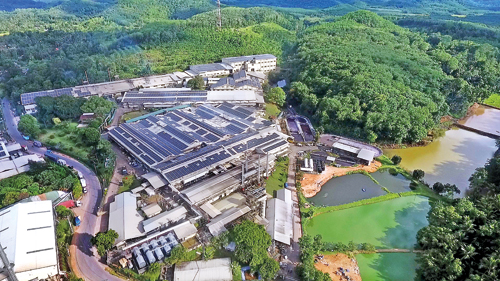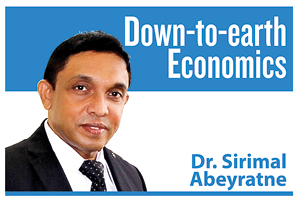Economics of power generation
View(s):
File picture of a rooftop solar power unit. Planners say solar power generation should be increased in the country.
Very often, it is not strange to hear an important announcement through a loudspeaker tied on the roof of a tuk-tuk passing through the neighbourhood. According to the announcement, the following day – which is always a public holiday -, electricity supply in the area would be disconnected for maintenance purposes! Sometimes the message would be sent through your hand phone.
Although I used to think that regular maintenance is a good thing, I never had that experience in any other country where I used to study and work; neither power-cuts nor power-failures even for a minute. Therefore, I used to think that this may be a problem in “under-developed” countries only.
However, our neighbours knew something more and had a different interpretation: “A big OT work! They know how to make up their overtime bill for holidays every month.” During the day without electricity, the neighbours come out of their houses which may be little uncomfortable to stay inside without electricity, and had free time to gather and gossip.
Costs of maintenance
The pre-announcement, however, allows people to get ready for a “holiday” without electricity. If it is a household, they will fill the water tank (in advance), operate the washing machine, try to consume all perishable food in the refrigerator and, even plan to visit a relative or a friend. But children complain as they miss their online tuition classes. In fact, all the online lectures, meetings, and seminars that had been planned in advance had to be put on hold.
The biggest problem is for businesses, which lose their operations and incomes for the day. Big businesses such as those supermarkets and factories have their own diesel-powered generators installed; it is an essential item to do business. They can pass its operational and maintenance costs to the customers, adding one factor that causes for higher prices. The problem is for the SMEs; small and medium businesses don’t have installed power generators so that they cannot do anything other than closing the business for the day.
Chicken, sausages and ice cream as well as jelly, yogurt and pudding…, and many other consumables in the refrigerators of small groceries continue to remain there without electricity. I do not know how suitable it is for people to consume them the following day, but I never heard of disposing any of them either!
Even more frightening is the case of pharmacies; some medicines and vaccines must be stored in refrigerators. I am not sure how many “small pharmacies” have installed power generators and, neither have I any idea about how suitable such medicines and vaccines should be given to the patients.
Economics, energy,
and energy economics
There was a webinar on September 9 organised by the Smart Energy Council of Sri Lanka (SECSL) where the thematic issue was “whether it is possible for Sri Lanka to generate 70 percent of its electricity from renewable energy sources by 2030”. Engineering Prof. Kithsiri Liyanage of the University of Peradeniya, who also happens to be a former Chairman of the Public Utility Commission, called me and asked if I can contribute to the webinar sharing some thoughts on “electricity generation and the economy”.
He clarified it further: “After all, electricity is much more than a technical matter”.
I agreed. “Yes, economics too matters for electricity generation, while electricity generation matters for the economy.”
 “Energy economics” is an influential branch of the subject area of economics in the world, but I have no idea whether there are trained “energy economists” in Sri Lanka. Neither have I myself trained in this branch of economics though I can speak only in “general” terms on the link between energy and the economy. But I know that, just as Prof. Liyanage said, energy planning in today’s world is carried out by a panel of experts in engineering, technology, economics, law, and environment.
“Energy economics” is an influential branch of the subject area of economics in the world, but I have no idea whether there are trained “energy economists” in Sri Lanka. Neither have I myself trained in this branch of economics though I can speak only in “general” terms on the link between energy and the economy. But I know that, just as Prof. Liyanage said, energy planning in today’s world is carried out by a panel of experts in engineering, technology, economics, law, and environment.
Even by looking at it from a bird’s eye point of view, it is not difficult to understand that energy is correlated with economic development on the one hand, while on the other hand, energy production itself is a subject of economics; the first is a “macroeconomic” perspective, while the latter a “microeconomic” perspective on energy production. Let’s look at it in detail.
“Bright darkness”
Economic development of a country generates demand for electricity for two reasons: The first is that it is a “result” of economic development because higher per capita income requires greater usage of electricity. Households tend to increase the use of electrical and electronic appliances which generate demand for electricity. With the development of the country, the governments too must increase the use of electricity for cities, streets and parks.
The second is that economic development itself needs electricity as an “input” which, in turn raises per capita income. Business start-ups grow and existing businesses expand, multiplying production and jobs as well as exports and imports; all these activities need increased supply of electricity. It is not just the electricity supply, but its “price” and “quality” matters too. If the price of an essential input is too high and its quality is too low, in effect it undermines the price and quality competitiveness of the output as well.
Sri Lanka is ahead of many other developing countries in terms of achieving 100 percent electrification of the country, including the rural sector. Nevertheless, contrary to that Sri Lanka is one of the poorest countries in the region in terms of electricity usage.
As per World Bank data, Sri Lanka’s per capita electricity usage is 531 KWh (Kilo Watt hours) per year, which is even lower than the South Asian average of KWh 705. Among other countries in the region, South Korea has electricity usage over KWh 10,000, Singapore 9,000, China 4,000, Thailand 2,500 and Vietnam 1,500. Sri Lanka’s poor electricity usage is, perhaps, a result of its high-price and low-quality issues on the part of electricity supply and of the country’s income poverty on the part of demand.
From natural monopoly
to state monopoly
The microeconomic issue is that electricity generation is an “industry” itself of which the value addition is part of the country’s GDP. It is, however, a specific industry that produces an output which is quite different from the output of other economic activities. It is a “non-tradable” output at least for some countries like Sri Lanka so that its price is determined in a “non-competitive” environment.
The matter is even worse than that due to another feature of electricity generation – the natural monopoly, which is often transformed into state monopoly. While the industries with natural monopolies can exploit the market through non-competitive prices resulting in super-normal profits, state monopolies in many countries, instead of solving that problem, have added another problem – inefficiency and losses.
The world has been, however, moving forward in attempts to arrest these issues with innovative solutions; they include an establishment of a separate regulator, split the industry into a number of separated business entities, open the industry for private investment, introduction of different modes of private-public partnerships, and other reforms. Thus, according to modern management practices in the world it is not a single industry mode, but a combination of many modes!
Energy and environment
Some of the fundamental economic principles are related to the fact that “there are alternative ways” of doing same business. A nation can decide various ways of mixing up its stocks of productive factors – capital, knowledge, human resources, and natural resources in order to bring out its product. Doing business in a sustainable manner is also a new mode. As development and environment are no longer viewed as “contradictory”, but “complementary”, it is a choice among a range of options available to a country including the question on how to generate electricity.
On the webinar question of achieving 70 percent renewable energy by 2030, speakers had their own views – yes and no; go fast and go slow. Searching for a sensible answer to that question in this column is, apparently, beyond the boundaries of our scope, because it is a question that must be answered by a panel of experts from different subject areas.
(The writer is a Professor of Economics at the University of Colombo and can be reached at sirimal@econ.cmb.ac.lk and follow
on Twitter @SirimalAshoka).


